Video
vimeo
Iran launches drone attacks on Israel from Ivan Alexander Golden on Vimeo.
0 notes
Video
vimeo
US-China Launch Counternarcotics Group from Ivan Alexander Golden on Vimeo.
0 notes
Video
vimeo
Visit Egypt and Explore The Mysteries Of Egyptian Civilization from Ivan Alexander Golden on Vimeo.
0 notes
Text
Cebu Mayor Rama says PH Online Classes "make no difference" for Hot Summers
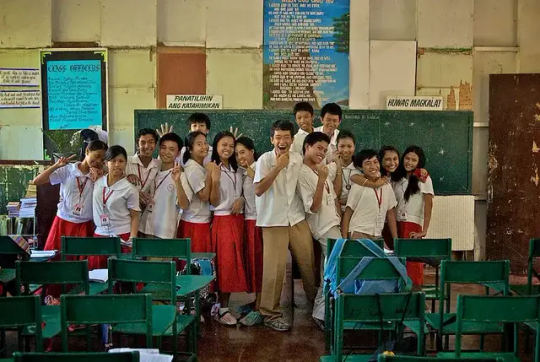
Learners should remain in the classroom instead of sending them back to online classes in their homes for fear of increased temperatures during the summer season, Mayor Michael Rama said Tuesday. “Why would you not allow children to be in their schools? You send them back to their homes… don’t you think it is also hot in their homes?” Rama said in Cebuano. Rama’s remarks came after the Cebu City Council passed a resolution Monday requesting the School’s Division to plot a measure that would go back to blended learning modalities adopted at the height of the coronavirus disease (Covid-19) pandemic.
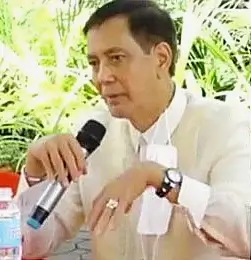
Cebu City Mayor Michael Rama. Photo by Philippine News Agency. The mayor expressed some misgivings about going back to online classes or modular lessons would affect the learner’s performance, saying that reading and comprehension lessons can be best taught in person rather than remotely done online or through modules. Children who are unsupervised by teachers would be tempted to play online games or watch videos instead of answering their modules, Rama said. “It might end up with parents doing the assignments,” he added, even as he stressed that teachers should not expose children to the extreme heat of the sun to avoid exhaustion and stroke. Cebu City Schools Division Superintendent Nimfa Bongo said a guideline has been circulated to the campuses laying down procedures for blended learning should the heat index here would increase to a “danger” level. “So far no one applied for it. Other schools observed blended modalities such as shifting of classes, with one group reporting in the classrooms and the other group in their homes,” she said in a radio interview. Bongo said children’s health and safety should be considered in deciding which modality would be observed amid the hot season. On Monday, the city posted a 38° Celsius heat index based on data from the Philippine Atmospheric, Geophysical and Astronomical Services Administration.
How will Global Warming effect the Philippines?
According to the world bank report published on the 9th of November 2022, Country Climate and Development Report (CCDR), climate change is exacting a heavy toll on Filipinos’ lives, properties, and livelihoods. If left unaddressed, it could hamper the country’s ambition of becoming an upper middle-income country by 2040. With 50 percent of its 111 million population living in urban areas, and many cities in coastal areas, the Philippines is vulnerable to sea level rise. Changes due to the variability and intensity of rainfall in the country and increased temperatures will affect food security and the safety of the population. Multiple indices rank the Philippines as one of the countries most affected by extreme climate events. The country has experienced highly destructive typhoons almost annually for the past 10 years. Annual losses from typhoons have been estimated at 1.2 percent of GDP. Climate action in the Philippines must address both extreme and slow-onset events. Adaptation and mitigation actions, some of which are already underway in the country, would reduce vulnerability and future losses if fully implemented. Sources: THX News, World Bank & Philippine News Agency. Read the full article
0 notes
Text
Can Migration Policies Unlock Global Prosperity?
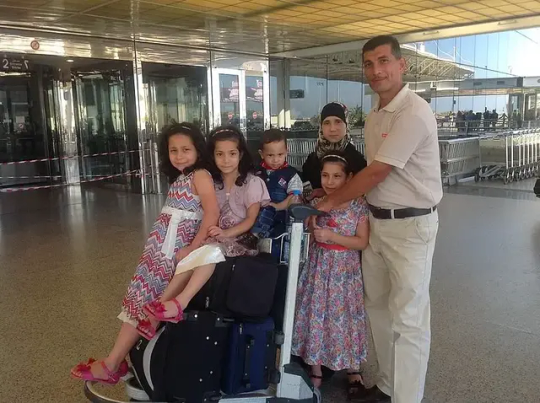
Populations across the globe are aging at an unprecedented pace, making many countries increasingly reliant on migration to realize their long-term growth potential, according to a new report from the World Bank. The World Development Report 2023: Migrants, Refugees, and Societies, identifies this trend as a unique opportunity to make migration work better for economies and people. Wealthy countries as well as a growing number of middle-income countries—traditionally among the main sources of migrants—face diminishing populations, intensifying the global competition for workers and talent. Meanwhile, most low-income countries are expected to see rapid population growth, putting them under pressure to create more jobs for young people. “Migration can be a powerful force for prosperity and development,” said World Bank Senior Managing Director Axel van Trotsenburg. “When it is managed properly, it provides benefits for all people — in origin and destination societies.” In the coming decades, the share of working-age adults will drop sharply in many countries. Spain, with a population of 47 million, is projected to shrink by more than one third by 2100, with those above age 65 increasing from 20% to 39% of the population. Countries like Mexico, Thailand, Tunisia and Türkiye may soon need more foreign workers because their population is no longer growing. Beyond this demographic shift, the forces driving migration are also changing, making cross-border movements more diverse and complex. Today, destination and origin countries span all income levels, with many countries such as Mexico, Nigeria, and the U.K. both sending and receiving migrants. The number of refugees nearly tripled over the last decade. Climate change threatens to fuel more migration. So far, most climate-driven movements were within countries, but about 40% of the world’s population—3.5 billion people—lives in places highly exposed to climate impacts. Current approaches not only fail to maximize the potential development gains of migration, they also cause great suffering for people moving in distress. About 2.5% of the world’s population—184 million people, including 37 million refugees—now live outside their country of nationality. The largest share—43%—lives in developing countries. The report underscores the urgency of managing migration better. The goal of policymakers should be to strengthen the match of migrants’ skills with the demand in destination societies, while protecting refugees and reducing the need for distressed movements. The report provides a framework for policymakers on how to do this. “This World Development Report proposes a simple but powerful framework to aid the making of migration and refugee policy,” said Indermit Gill, Chief Economist of the World Bank Group and Senior Vice President for Development Economics. “It tells us when such policies can be made unilaterally by destination countries, when they are better made plurilaterally by destination, transit and origin countries, and when they must be considered a multilateral responsibility.” Origin countries should make labor migration an explicit part of their development strategy. They should lower remittance costs, facilitate knowledge transfers from their diaspora, build skills that are in high demand globally so that citizens can get better jobs if they migrate, mitigate the adverse effects of “brain drain,” protect their nationals while abroad, and support them upon return. Destination countries should encourage migration where the skills migrants bring are in high demand, facilitate their inclusion, and address social impacts that raise concerns among their citizens. They should let refugees move, get jobs, and access national services wherever they are available. International cooperation is essential to make migration a strong force for development. Bilateral cooperation can strengthen the match of migrants’ skills with the needs of destination societies. Multilateral efforts are needed to share the costs of refugee-hosting and to address distressed migration. Voices that are underrepresented in the migration debate must be heard: this includes developing countries, the private sector and other stakeholders, and migrants and refugees themselves. Sources: THX News & World Bank. Read the full article
0 notes
Text
UK Space Assumes Command of Worldwide Disaster Monitoring

The UK Space Agency is taking over the leadership of the International Charter Space and Major Disasters (The Charter), which provides data from satellites to aid disaster response around the world. The UK Space Agency’s six-month leadership will begin with the 49th Board Meeting of the Charter in Edinburgh this week (24 – 28 April 2023), attended by space agencies and organisations from across the globe. The Charter has 17 members and 270 contributing satellites, supporting people in need in 131 countries. This mobilises space agencies and satellite operators across the globe and benefits from their knowledge and satellites through a single access point which operates 24 hours a day, 7 days a week and at no cost to the user.
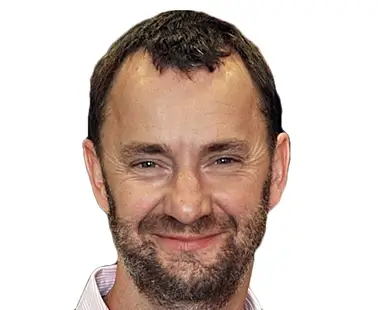
Dr Paul Bate. CEO of the UK Space Agency. UK.GOV. Dr Paul Bate, Chief Executive of the UK Space Agency, said: All too often we hear reports of the devastating and far-reaching consequences of natural disasters on communities across the globe. Satellites play an important role in the response, with Earth observation data used worldwide to map, monitor and mitigate impacts and, ultimately, to save lives. That is why the UK is a proud member of the International Charter Space and Major Disasters, which has been activated more than 800 times since November 2000. As we assume the leadership of the Charter we look forward to working with our fellow members to drive forward this vital humanitarian service. Since it launched, the Charter has been activated over 815 times to date for natural and man-made disasters such as cyclones, floods, landslides, earthquakes and oil spills.
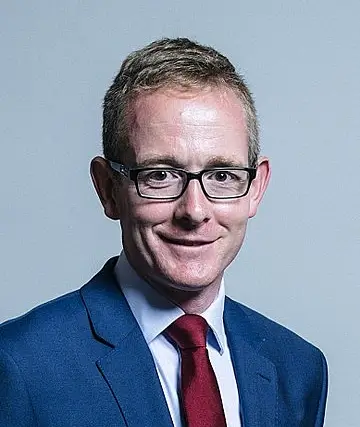
Official portrait of John Lamont, Minister for Scotland. Photo by Chris McAndrew. Wikimedia. UK Government minister for Scotland, John Lamont, said: I would like to welcome the members of the International Charter Space and Major Disasters to Edinburgh as the UK begins our six-month leadership. The Charter is a fantastic example of how the international community can work together to help with natural disasters around the world. Here in Scotland, we have seen the benefits of this group with the satellite imagery of the flooding in Aberdeenshire last year which helped local agencies deal with the issue. Weather-related disasters are the most common cause for a Charter activation. On average, the Charter is activated 42 times per year, although since 2020 this has risen to an annual average of 50. This included an activation for flooding in Scotland in November 2022.
What is the Charter?
Formed on 20 October 2000 by the European Space Agency (ESA), French Space Agency (CNES) and the Canadian Space Agency (CSA), with the UK joining in 2005, the Charter is a worldwide collaboration, making satellite data available to help with disaster management. It helps us respond to major natural and human-made disasters, with the aim of saving lives and livelihoods. Information and maps derived from satellite data sourced via the Charter assists the coordination of resources and expertise for rapid response in major disaster situations, helping civil protection authorities and the international humanitarian community. The Charter can be activated by authorised users from over 80 countries and the UN, as a cooperating body. All countries can ask an authorised country to activate the Charter on their behalf, meaning the Charter can be used by any country in need, anywhere in the world. Any country can also apply to become an Authorised User under the Charter’s universal access initiative.

Satelite in orbit. Photo Artwork by Thales Alenia. UK Government.
What happens when disaster strikes?
When a disaster strikes, an Authorised User (AU) activates the Charter, kick-starting an international effort. In some cases, co-operating bodies and organisations may request further data. Next, an On-Duty Operator, who is available 24 hours a day, verifies the activation and forwards it to an Emergency On-Call Officer (ECO). The ECO then prepares by identifying available satellites and which of those would be the best ones to use based on the disaster type and circumstances. This plan is submitted to the relevant satellite operators, who task their satellites accordingly. Then, a Project Manager (PM), an expert in data handling, is assigned by the Executive Secretariat to assist the AU. The PM coordinates the delivery of maps from the Value-Added Providers - they take the data provided by member agencies and interpret this, assessing what they see from the satellites; for example, in a flood they can monitor and track the change in flood extent and water levels. These maps are then given to the end-user to plan their disaster management and relief efforts.
The Charter and the UK
Since 2005 the UK has contributed satellite imagery and operations to the Charter through the DMC Constellation and high-resolution Vision-1 satellites, operated by Airbus Defence and Space Limited. The UK team at Airbus performs Emergency on-Call Officer duties and jumps into action to task these UK missions and provide disaster response imagery whenever required. The UK has activated the Charter on multiple occasions, the last time as recent as November 2022 for flooding in Scotland, with torrential rail causing roads and rail travel to be impacted, with school closures and power cuts affecting areas in Aberdeenshire. The satellite imagery of the area provided by the Canadian Space Agency’s RADARSAT RCM assisted the Scottish Environment Protection Agency in determining flood extent and the height of the water levels over large areas, resulting in the issuing of relevant warnings as well as planning and preparation for any rescues. The Charter is an invaluable international tool that frequently provides lifesaving information and data. So spread the word and be assured that, when the next disaster hits, there are globally connected teams working together and using satellites to save lives. Sources: THX News & UK Space Agency. Read the full article
1 note
·
View note
Text
PBBM Unveils Plan To Combat Water Table Impacts of El Niño

The government has stepped up efforts to convert the country’s dependence of water supply from underground water to surface water, President Ferdinand R. Marcos Jr. said Monday. The President made the comment in an interview with former Social Welfare Secretary Erwin Tulfo, stressing the need for different government agencies to make the necessary preparations to address the looming dry spell or El Niño phenomenon. “Kasi tubig ang pinag-uusapan, marami talagang elemento na kailangan isama diyan sa usapan na ‘yan (Because we are talking about water, there are many elements that need to be included in that talk). But we are slowly converting our dependence of water supply from underground water to surface water. ‘Yun ang pinaka-basic diyan (That’s the most basic) and then the distribution systems,” Marcos told Tulfo’s radio program in the government-owned Radyo Pilipinas. ‘Yung ating mga…kung pupuntahan mo ‘yung mga distribution system natin sa mga water authority, kung titingnan mo ‘yung mga ano, noong giyera pa nilagay ‘yung ano… noong panahon pa ng giyera eh noong nilagay ‘yung mga tubo-tubo eh (If you go to our distribution system of our water authorities, the pipes were installed during the war),” the President pointed out. Marcos, who recently signed an executive order creating a Water Management Office, said the government platform will help deal with the country's water crisis. He said: “So… ganun ang approach namin na kailangan na magkaroon ng sapat na supply ng malinis, ligtas na tubig na kahit pag masyadong mahina ang ulan o nagka-El Niño, masyadong mainit ay magkakaroon tayo ng… mayroon pa rin tayong water supply (Our approach is to have enough supply of clean, safe water that even if the rain is scarce or El Niño occurs, we still have water supply),” He further said the government has ramped up its alert and warning systems to provide El Niño forecasts and impacts. “Kaya’t, ‘yun isa pa ‘yan, pinapatibay natin ang kakayahan ng DOST (Department of Science and Technology), ng PAGASA (Philippine Atmospheric, Geophysical and Astronomical Services Administration) para ma-warningan naman talaga tayo nang mabuti na may parating na ganito (We have strengthened the capacity of DOST, PAGASA so that we get accurate warning that this thing is coming).” In a previous sectoral briefing, Marcos tasked agencies to come up with a whole-of-government strategy to address the El Niño phenomenon that may hit the country this year until early next year. Two specific instructions given by the President are the adoption of a whole-of-government or whole-of-nation approach and putting up protocol-based and scientific long-term processes that could be adopted by the country. Sources: THX News & Philippine News Agency. Read the full article
0 notes
Text
Acorda Spearheads Efforts to Revive Public Trust in PNP

Newly installed Philippine National Police (PNP) chief Gen. Benjamin Acorda Jr. on Monday committed that the PNP will be vanguards of peace to ensure a safe and economically stable community and to be steadfast in providing police service under his leadership.
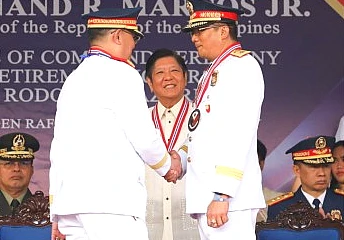
Change of command at the PNP. Photo by Rey Baniquet. PNP. President Ferdinand R. Marcos Jr. has appointed Acorda as the 29th country’s top cop during the change of command ceremony in Camp Crame in Quezon City. He succeeded PNP chief Gen. Rodolfo Azurin Jr. who is celebrating his 56th birthday, the mandatory retirement age for police officers. As he took command of the 228,000-strong, Acorda said he would put a premium on moral ascendancy in the promotion and placement of officers in key positions and also vowed that he would lead by example in order for all members of the PNP to always do what is right. Acorda said in his speech as he expressed gratitude to the President for his trust and confidence in him. “As we give a premium to the morale and welfare of our men and women in the organization, assignment and positioning will be based on merit, ability and moral ascendancy. Under my leadership, we will be your partner in ensuring a secure, peaceful and crime-free community.” Acorda also expressed his gratitude to Azurin for his aggressive campaign on internal cleansing. “I will continue what you started in cleansing the PNP,” he said. The PNP is currently facing a controversy regarding the alleged involvement of policemen in illegal drug activities. Earlier, at least 42 members of the PNP Drug Enforcement Agency were disarmed and ordered to be restricted to quarters over the alleged lapses in the operation that led to the confiscation of 990 kilos of shabu in Manila last year. Acorda also vowed relentless campaign against criminality and illegal drugs. He warned erring members of the PNP involved in illegal activities. “My stand on anti-illegal drugs is clear, no police should be involved in pushing, using or whatever means of illegal drug trade. You will be charged and removed from the service,” Acorda said. “This is my warning to each and every one of you, our fight will be holistic in prevention and aggressive in operations. Under my leadership, rewards and punishment will be quick and decisive, it shall be fair and impartial and due process shall be observed. We will establish unity, promote patriotism, uplift morale, strengthen cooperation and instill discipline in our organization,” he added. Acorda, who is a member of the Philippine Military Academy Sambisig Class of 1991 and hails from the province of Ilocos Norte, said he will continuously strive to make PNP worthy of the trust and confidence of the public. Before his appointment as the new country's top cop, Acorda was the director of the PNP Directorate for Intelligence. Meanwhile, Azurin said he remained true to his promise to ensure peace and order and stability while President Marcos marks his first year in office. PNP chief Gen. Rodolfo Azurin Jr. said in his retirement speech. “These promises I think I fulfilled in the past 8 months of my stint with help from my counterparts in the AFP (Armed Forces of the Philippines) and the uniformed services and all the good senators and congressmen and women. I am fortunate to have worked with past PNP chiefs because of the values I learned from them on leadership and character,” “Today as I retire and stand before you Mr. President, I can honestly say that I have achieved the goals I set for you and the Filipino people. As of today, your administration is stable under my leadership since I assumed as Chief PNP, the total crime volume decreased by 9,038 and I believe that this decline directly or indirectly contributed to the economic growth of the country,” he added. Sources: THX News & Philippine News Agency. Read the full article
#chiefGen.BenjaminAcordaJr#Gen.RodolfoAzurinJr#PhilippineNationalPolice#PNP#PresidentFerdinandR.MarcosJr#PublicTrustinPNP
0 notes
Text
3 Year Export Standoff Between South Korea and Japan Ends

South Korea on Monday put Japan back on its "white list" of trusted trading partners, three years after the removal, in a move to improve their bilateral economic and diplomatic relationship, the industry ministry said. The Ministry of Trade, Industry and Energy issued a revision to its public notice on exports and imports of strategic items in the day that calls for restoring Japan's fast-track trade status, allowing companies that export strategic items to Japan to enjoy a shorter time for review and simpler paperwork. The move raised the number of nations given preferential treatment in trade to 29, which includes the United States, France and Britain, it added. In 2019, South Korea took Japan off its white list following Tokyo's removal of Seoul from its list in apparent retaliation against the South Korean Supreme Court rulings the previous year that ordered two Japanese companies to pay compensation to Korean forced labor victims during Japan's 1910-45 colonial rule of the Korean Peninsula.
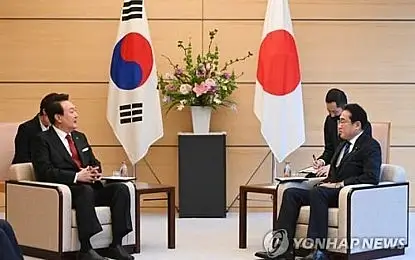
S Korean President Yoon Suk Yeol and Japanese PM Fumio Kishida holding talks in Tokyo on March 16, 2023. Photo by Philippine News Agency. Last month, however, the two sides vowed the reinstatement after South Korea announced plans to compensate the victims without asking Japan for contributions. Japan has not yet given details about when South Korea will return to its trade white list, though South Korean officials said Tokyo needs longer domestic procedures for a necessary law revision. Director-level officials from Seoul and Tokyo will begin another round of trade talks in Tokyo on Monday following a meeting in Seoul last week. Japan lifted curbs on exports to Seoul of three materials last month -- fluorinated polyimide, photoresist and hydrogen fluoride -- that are critical for the production of semiconductors and displays, which had been in place since 2019. Under the revised public notice, South Korea also announced a decision to tighten export controls on major industry items against Russia and Belarus in response to Moscow's invasion of Ukraine, which will take effect Friday. The Seoul government added 741 more items related to semiconductors, chemicals, steel, autos, machinery, quantum computers and other things to the list of items that are banned from shipping to Russia and Belarus, significantly raising the total number of items on the list to 798, according to the ministry. The move came as the chances are high for those items to be used by importing nations for weapons and military purposes, the ministry said, adding that it will make a case-by-case review for "exceptional cases" for shipments to the two nations. Sources: THX News & Philippine News Agency. Read the full article
0 notes
Text
Hedcor Aid to Mindanao Medical Centers

Hedcor and Aboitiz Foundation, Inc. donate much-needed medical supplies, equipment and furniture worth P350,000 to two newly refurbished sub-health centers in Sitio Centro Pogpog and Lib-in, Barangay Sibulan, Municipality of Santa Cruz, Davao del Sur. In 2021, Hedcor and Aboitiz Foundation, Inc. successfully implemented the repair of the sub-health centers. As a continuing project, the health centers receive promotional equipment, appliances, clinic beds, tables, drawers, medicines and other medical equipment that will strengthen the health care services and make it more accessible, usable and available to the community, especially the indigenous community in the province. Hedcor President and COO Rolando Pacquiao acknowledged the health workers for their unrelenting service in the community. “Our health workers need sufficient supplies and reliable equipment to provide quality health services to patients and residents of Barangay Sibulan and nearby areas. These donations will definitely aid the operations of the health facilities, strengthen the health system and be able to better respond to the health needs of the community," said Pacquiao. Santa Cruz Municipal Health Officer Dr. Raygene Manuel shared that the barangay health workers (BHW) feel blessed to receive Hedcor and Aboitiz Foundation's donations that will be used to help their constituents. Dr. Raygene Manuel, said: “We know that not all communities were given this kind of health assistance, and we are truly fortunate to receive these. I am proud to say that our BHWs are very dedicated and always ready to be of service.” Meanwhile, in the Province of Bukidnon, Hedcor turns over to the Municipality of Impasugong its Health Center's completed covered pathway worth P250,000 as part of Hedcor and the local government unit's commitment to putting health a priority. The covered pathway is beneficial in a healthcare environment. It is used as a linkway between the regional health unit's building, providing staff, patients and visitors a dry journey and shelter from bad weather especially those who came from far-flung areas. 13 barangays in the Municipality of Impasugong are availing the Rural Health Unit services. Municipal Mayor Anthony Uy said the completion of the covered pathway is one of the testaments of Hedcor's commitment to the health system enhancement initiatives of the municipality and the general welfare of the locals. Mayor Anthony Uy, shared: "This is a milestone being undertaken by the local government unit and Hedcor to ensure that the health services and the health needs of Impasugong are given utmost importance." And to improve the delivery of health services, barangay and municipal health workers in Bukidnon and Davsur will receive refresher courses on how to respond to health emergency situations from Department of Health (DOH) and Municipal Health Office representatives. "May these regenerative projects continue to strengthen our relationship with our community in pursuit of transforming energy for a better world," said Hedcor President and COO Rolando Pacquiao. Hedcor is the renewable energy subsidiary of Aboitiz Power Corporation.
About the Hedcor Group
Hedcor Group has been generating renewable energy from run-of-river hydropower systems for over four decades, making it a leading hydropower operator in the Philippines. With 22 hydropower plants under its management, the group currently supplies the country with more than 278 MW of clean and sustainable energy. By providing power generation that is least disruptive to the environment, Hedcor is helping communities and businesses achieve a better and greener tomorrow. With its commitment to sustainability and renewable energy, Hedcor is indeed a company worth recognizing.
About the Aboitiz Foundation
The Aboitiz Foundation is a testament to the Aboitiz Group’s commitment to corporate philanthropy. Spanning over a century, the group’s legacy of giving back has been instilled and passed on through generations. One of its first leaders, Don Ramon Aboitiz, initiated corporate philanthropy efforts and prioritized the welfare of the company’s employees. As the Aboitiz Group diversified into multiple businesses, its commitment to giving back grew as well. While the group gave to various causes informally for decades, it realized the need for a more efficient and effective way of giving. Thus, the Aboitiz Foundation came into existence to better assist areas where the company operates. Today the organization has given out around 36,000 scolarships and benefited nearly 4 million people though philanthropy. Sources: THX News, Aboitiz Foundation, Hedcor Group & The Philippine News Agency. Read the full article
#AboitizFoundation#DavaodelSur#HedcorGroup#MindanaoMedicalCenters#PIA#RolandoPacquiao#SantaCruz#ThePhilippineNewsAgency
0 notes
Text
Union Leaders Rally Behind Su
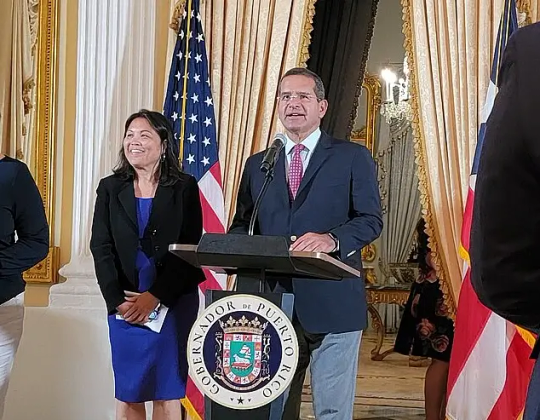
Today, Politico highlighted a broad range of voices coming out forcefully in support of Acting Secretary Julie Su’s nomination to be U.S Labor Secretary, including labor unions, business groups, former Secretary of Labor Marty Walsh, and others. “‘Julie Su has been a champion for labor, and labor is mobilizing in the way only we can,’ AFL-CIO spokesperson Ray Zaccaro said. he administration has highlighted her support from groups like the Los Angeles Chamber of Commerce, Small Business Majority and those representing Asian American and Pacific Islanders. If confirmed, Su would be Biden’s first APPI Cabinet secretary and his fourth AAPI Cabinet member overall.” Walsh has also been actively engaged in the process and advocating for Su with labor and business leaders and senators, according to an administration official.”
The full story:
Politico: Unions pour on support for Biden’s Labor pick amid confirmation worries Authors: Nick Niedzwiadek and Jennifer Haberkorn. Unions are stepping in to boost President Joe Biden’s pick to lead the Labor Department as Democrats seek to avert an embarrassing defeat that would set back the administration’s agenda for workers. Unified Republican opposition to the nominee, Julie Su, has the unions and the White House focused on a handful of moderate senators who have yet to make their intentions known — Mark Kelly (D-Ariz.), Joe Manchin (D-W.Va.), Jon Tester (D-Mont.), Angus King (I-Maine) and Kyrsten Sinema (I-Ariz.). The AFL-CIO this week began rolling out a campaign to drum up support for Su, with an emphasis on getting local affiliates to lean on undecided senators and a six-figure ad buy running in Washington, D.C. and Arizona. The “Stand with Su” effort is a direct counterweight to some of the forces that have been lobbying against her — including the name choice, as one of the main anti-confirmation groups is called “Stand Against Su.” “Julie Su has been a champion for labor, and labor is mobilizing in the way only we can,” AFL-CIO spokesperson Ray Zaccaro said. A key part of the pitch is that Su, who faces a committee vote Wednesday, is in the same mold as former Labor Secretary Marty Walsh, a seasoned politician who had fans on both sides of the aisle and who has been directly involved in rounding up support for her, according to an administration official. Su served as Walsh’s deputy secretary beginning in July 2021 and has been acting head of the department for the past month, after Walsh stepped down to run the NHL Players’ Association. “She has worked hand in hand with Marty Walsh,” American Federation of Teachers President Randi Weingarten told POLITICO. “If you liked the way Marty Walsh operated as the Secretary of Labor, then there’s no reason not to embrace Julie Su.” But Republicans say Su, who was labor secretary California before coming to Washington, would veer sharply left of Walsh and used a confirmation hearing this week to portray her as anti-business and captive to labor’s priorities. Although all five of the senators in question voted to confirm Su as deputy secretary, Manchin, Tester and Sinema are likely to face tough reelection fights next year. “The more that people learn about her track record and just how bad she was in this role in California, we’re seeing that shifting the debate,” Rep. Kevin Kiley (R-Calif.), a leading critic of Su, told POLITICO prior to her confirmation hearing. “It’s very different when you’re going for the top position than being under Marty Walsh.” The battle over Su is the Biden administration’s first attempt at replacing a Cabinet secretary, and the latest test of Democratic leadership’s ability to confirm nominees after multiple high-profile misfires. Though Su is already steering the department, administrations are typically wary of issuing major policy decisions without a permanent leader, meaning that a protracted confirmation fight could bog down the agency for months. Administration officials are holding nightly “war room” calls with Su’s backers to discuss the game plan for the following day and to track developments, according to a White House official. The administration also holds 15 to 20 check-in calls per day across labor and business groups. Walsh has also been actively engaged in the process and advocating for Su with labor and business leaders and senators, according to an administration official. Many Democrats on Capitol Hill are hopeful Kelly, Tester and King will support Su. If that is the case, and Sen. Dianne Feinstein remains in San Francisco recovering from shingles, Su and the White House would still need to win over Manchin and Sinema, both of whom have bucked the president in the past. Neither senator is on the committee that will vote Wednesday on whether to advance Su’s nomination to the floor and attention will fully turn to them immediately after the vote. Su has been ramping up her meetings with senators of both parties in recent weeks, though she has yet to meet with several key holdouts. She has spoken to Sinema, according to two sources familiar with the situation, and the White House is in touch with Manchin, an administration official said. Su doesn’t have a traditional “sherpa,” a veteran lawmaker or some other plugged-in operative who typically leads Cabinet officials and other important nominees through the confirmation process on Capitol Hill. The lack of one has raised eyebrows among some of Su’s supporters about the White House’s level of support for the nomination. The term “sherpa” is being phased out at the White House, however. Instead, she has a “navigator” — the senior leader of the Labor Department’s congressional affairs shop. The office has led Su through the process and accompanied her at each of her Senate meetings, according to that official. Su is only the second Cabinet official to go through the confirmation process since the first months of the Biden administration — Office of Science and Technology Policy Director Arati Prabhakar being the other — and the agencies now lead the confirmation process, an administration official said. With an obvious eye toward Manchin, the White House has heavily touted Su’s support from labor unions, including the AFL-CIO, Teamsters and, most significantly, United Mine Workers of America. While a recent letter of support from Mine Workers President Cecil E. Roberts may pull weight with Manchin, Su supporters have been cautious to not be too heavy-handed with either him or Sinema, knowing that an overt lobbying effort may backfire. “The White House knows what they need to do for the best outcome to get Julie Su confirmed,” said an organized labor official, who requested anonymity to discuss political strategy. “They know the relationship dynamics they have with the senators in question. And they know it’s a complicated circumstance that requires deft and delicate management.” The White House’s light-touch strategy is not entirely reliant on unions to shoulder the lobbying load and the administration has highlighted her support from groups like the Los Angeles Chamber of Commerce, Small Business Majority and those representing Asian American and Pacific Islanders. If confirmed, Su would be Biden’s first APPI Cabinet secretary and his fourth AAPI Cabinet member overall. But organized labor is at the center of the pro-Su push. “There’s a world of Julie Su supporters out there, and we’re trying to show that,” the labor official said. “We saw these senators vote for her and there’s no reason to vote against her now. It remains to be seen just how uncertain they actually are.” Sources: THX News, The White House & Politico. Read the full article
0 notes
Text
Will Brownlee's Health Threaten PBA Title Hunt?

Justin Brownlee's health status is the main storyline for Game 6 of the PBA Governors' Cup Finals at the Smart Araneta Coliseum in Quezon City on Friday night. Brownlee was taken to the hospital late in the third quarter of Game 5 after he felt the effects of food poisoning. "It was really severe food poisoning," Ginebra coach Tim Cone said, disclosing that his team's resident import was already experiencing gastrointestinal problems hours before the game. Brownlee was even seen throwing up on the court while the game was ongoing before the team sought medical help in the hospital. An insider from the Gin Kings' camp told the Philippine News Agency (PNA) that it had something to do with a meal Brownlee ate on Tuesday. With Brownlee out for the remainder of the game, TNT clawed back and took a 104-95 win to go 3-2 up in the best-of-seven series. The Tropang Giga can officially eliminate the Gin Kings and clinch their ninth PBA title with a Game 6 win, but coach Jojo Lastimosa is wary that Brownlee might do a revenge game reminiscent of Michael Jordan's "flu game" in the 1997 NBA Finals to send the series to a rubber match on Sunday night. "He's a warrior. We're counting on everyone to be present on Friday," Lastimosa said. Brownlee was discharged from the hospital on Thursday night. But with barely 45-and-a-half hours separating Games 5 and 6, scheduled for a 5:45 p.m. tip-off on Friday, whether Brownlee shows up 100 percent or not is up in the air. "Hopefully, within 48 hours, he can get back and get ready to play," Tim Cone said. Sources: THX News & Philippine News Agency. Read the full article
0 notes
Text
Biden and Petro (Columbia) Meet: What's On The Agenda?
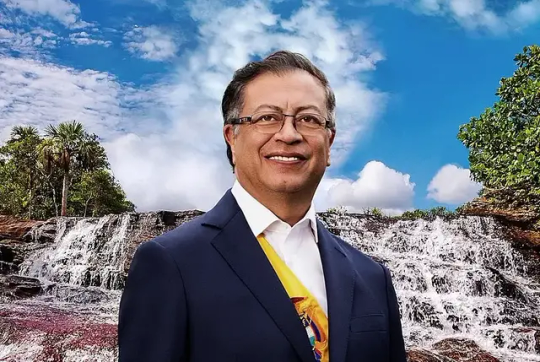
Transcript of the conversation
PRESIDENT BIDEN: Well, Mr. President, welcome. It’s great to see you here in the Oval Office and in Washington. And, by the way, Happy Birthday. PRESIDENT PETRO: (Laughs.) Gracias. Muy amable. (As interpreted.) It was yesterday. The 19th of April is a very important date for Colombia, for Latin America, and for me as well. PRESIDENT BIDEN: Well, it’s very difficult turning 40 years of age. (Laughter.) PRESIDENT PETRO: (As interpreted.) They say that, in this generation, being 63 is like being 40 in the old generation. PRESIDENT BIDEN: I fully subscribe to that. Mr. President, I’ve long believed, as you probably know, that Colombia is the key to the hemisphere — and I mean that sincerely — the keystone. And I think we have an opportunity, if we work at it hard enough, to have a Western Hemisphere that is united, equal, democratic, and — and — and — and economically prosperous. Together, Colombia and the United States are leading an effort to deal with climate change and to — I’ve been working for a long time, and we make — we’re going to make a $500 million commitment to deal with preserving the Amazon. And working through the Americas Partnership for Economic Prosperity, we’re working to grow our economies from the bottom up and the middle out, not from the top down. And I know we share one view very passionately: that it’s inherent — their inherent dignity and the rights of individual workers. We’re also working together to counter narcotics trafficking and address the historic levels of migration in our hemisphere, especially through the Darién Gap. And, Mr. President, I want to thank you for the hospitality and support Colombia continues to show to Venezuelan refugees. It’s a humanitarian and a generous thing for you — that you’re doing. And as I know you know, we’re working closely with regional partners to help Colombia meet this challenge, which is consequential and — and costly. And I really want to thank you for your outspoken and strong commitment to peace and human rights across the Americas. You speak to it all the time. And as we begin the next century of our partnership, I believe we can do even more to deepen and develop cooperation. So I want to thank you again for taking the time to be here, and I look forward to our conversations. PRESIDENT PETRO: Gracias. (As interpreted.) The Americas has, across all the countries, two common elements in its history. Unlike other parts of the world, our countries grew ever since their founding under the concepts of democracy and freedom. The concept of democracy and freedom is not etched in stone; rather, it is a flow. It flows along, and it evolves with history and becomes ever more profound. So we are going down the same river, a river that leads us to ever greater democracy and ever greater freedom. We also share in common that in this hemisphere there’s almost never been war between the nations, between the peoples. We are well accustomed to peace and not war. Therefore, democracy, freedom, and peace constitute our common agenda. And if we look at the economy, today, humankind and the whole Earth calls for an in-depth thoroughgoing economic change. We need to move from a fossil fuel sort of capital, the coveting of fossil fuel — which has evolved like a hurricane that is increasingly threatening our existence — to an economy that does not use coal, oil, or gas. If we put together these pillars of political and economic — on the political side, democracy, freedom, and peace; and on the economic side, building decarbonized economies — then I think we can have a common destiny whereby this region of the Americas can become a beacon for all humankind. I believe that humankind in the Americas may well have the greatest potential for democracy and freedom in the Americas, as well as the greatest potential for green energies — clean energies. So we have a common agenda and a lot of work to do. Thank you so much for having received me in your house. PRESIDENT BIDEN: Well, I couldn’t agree with you more. By the way, this morning I had a teleconference with 10 other nations in preparation for the next COP meeting. And I honestly believe we’re making some real progress moving toward a carbon-free environment. And one of the things we may talk about is how we can be of assistance in coming through the Panama Canal to Colombia for your electric needs. But that’s for a longer discussion. Thank you all. Sources: THX News & The White House. Read the full article
0 notes
Text
Jewish Community Welcomes Minister Ebrard for Mural Unveiling
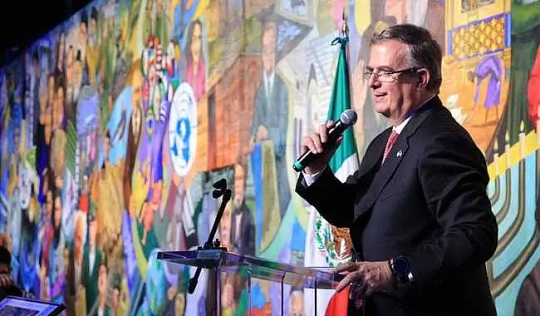
Foreign Minister Marcelo Ebrard attended the presentation of the mural "Am Yisrael Chai" by Mexican artist Julio Carrasco Bretón at the Monte Sinai Cultural Center in Mexico City last night at the invitation of the Jewish community. In his speech, Secretary Ebrard pointed out that the mural is: "historic not only for its dimensions but for everything it represents." "It has a lot to do with the origin of Mexico, with the way we Mexicans express ourselves and a powerful pictorial current, muralist, that determines or defines Mexico's contribution to the world." “It is not only that it is a monumental work, it is not only that it tells an extraordinary story that is the history of the Jewish people, four thousand years, but it also synthesizes the relationship between the people of Mexico, the Jewish-Mexican community and the people From Israel". “We are a country that prides itself on its deep tradition of receiving anyone who needs refuge,” The 44-meter-long mural "Historical Image of the Origin and Creation of the State of Israel" whose final destination will be Tel Aviv, Israel, synthesizes the four thousand years of history of the people of Israel. The event was attended by the Minister of Diaspora Affairs of Israel, Amichai Chikli; the mayor of Samaria, Yossi Dagan; the Israeli ambassador in Mexico, Zvi Tal; the president and founder of the Israel Latin American Network Foundation (ILAN), Isaac Assa Farca; the president of the Monte Sinai Community, Alberto Kichik; former half-track commander in the Israeli Armored Corps, Moshe Levy; the Mexican artist dedicated to mural painting, Julio Carrasco Bretón; and the Undersecretary for Multilateral Affairs and Human Rights, Martha Delgado Peralta.
Foreign Minister Marcelo Ebrard Full Speech:
Good evening, thank you very much for the invitation, dear, dear friends, I especially greet those who come from Israel, thank you very much for being here. Minister, thank you for joining us. Friends, friends of the different communities or the Jewish community, and endearing companions of many stories; I see many familiar faces of endearing people. Briefly, I bring you a greeting from President López Obrador, his congratulations for this work, Isaac, is something beyond any expectation. It is really very difficult to describe what a mural with four thousand years of history means. It has a lot to do with the origin of Mexico, with the way we Mexicans express ourselves, and a powerful pictorial current, muralist, that determines or defines Mexico's contribution to the world. So it's not just that it's a monumental work, it's not just that it tells an extraordinary story, which is the history of the Jewish people, four thousand years, but it also synthesizes the relationship between the people of Mexico, the Mexican-Jewish community and the people of Israel. Why do we understand each other? Well, Mexico is a country that has more or less 68 native ethnic groups today, with 68 languages. In this country you cannot stop being, you are diverse from the moment you are born, if you don't understand it you don't understand Mexico. We have in our country communities coming from abroad, important at least 49; the majority, are linked to political, religious, or any kind of persecution. We are a country that prides itself on its deep tradition of welcoming anyone in need of shelter. And when it was the turn of the Jewish community, our country opened the door, and here we are. Now we are part of the same community, how can we not understand each other? But Mexico is also a people that was persecuted for a long time, we have four invasions, not counting the Spanish one. People were persecuted for what they believed, the first actions of the inquisition in Mexico were against people who were Jewish and also who were, or spoke Nahuatl, Otomi, Zapotec, Purépecha. Still in the 19th century, they wanted to exterminate the Yaquis who survived with extraordinary tenacity, they had more than 10,000 deaths because they did not want to give up their land, their water and their religious ideas, their ideas... their worldview. So, how is Mexico not going to understand or how are Mexico and the Jewish people not going to understand each other? It is what synthesizes this mural, I would say historical, not only because of its dimensions but because of everything it represents. So today it is an honor for me to be with you, to tell you: we love you, we appreciate you and we understand you. I'm not talking about history anymore, we have the risks today. It has already been said in this rostrum what risks there are. For us in Mexico, well, how can we forget? Already as Secretary of Foreign Relations, the tragedy of 2019 in El Paso, Texas, that a guy entered a Walmart to kill Mexicans because we were invading his country -he made a manifesto that two million people saw- and he killed grandparents who were with their children, their grandchildren, to buy school supplies. And the first community that supported us in the United States was the Jewish community, and I remembered what my great-uncle used to tell me when I was very little about why he went to war against the Nazis having been born in Coyoacán. By? Why did they go? There were 28 Mexican women, Mexicans of different origins from their, let's say closeness; because you couldn't stay silent and do nothing against Nazism, because you couldn't stay and stand aside or look the other way when these guys wanted to destroy many peoples, including Jews, just because of what they believed and they thought. You could not. And when this tragedy occurred in El Paso, the first community that helped us in the United States with which we are working, was the Jewish community, how can we not understand each other? Of course, we understand each other and we are close every time we need each other. So, thank you very much, Isaac, for this work, very moving, and speaks a lot about the past, but it speaks more about the future that we have together; and keep fighting and not turn a blind eye to brutality, totalitarianism, and any action against any people. Let's say “no” as we have always done, is what this mural says. Thank you so much. Sources: THX News & Gobierno de Mexico. Read the full article
0 notes
Text
Preview of Jill Biden Speech at Congressional Families Cancer Prevention Program
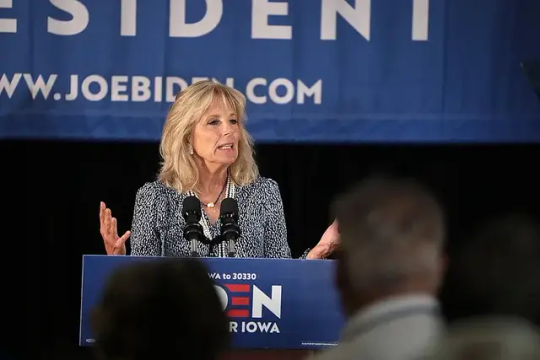
The last two years, I’ve joined many of you for the Congressional Club Spouses Luncheon. And I’ve talked about learning to navigate the unique role of being a political spouse. I promised myself I would never waste the platform I’ve been given. Many of you know that challenge well. But looking at this crowd of accomplished and diverse leaders from across our country, I’m thinking not of the power of one voice, but of many. Last month, I visited New Orleans to tour the Louisiana Cancer Research Center with Senator and Dr. Cassidy. And I learned about the ways their state is coming together, across party lines, to address disparities and save lives. And that includes Dr. Laura Cassidy’s efforts to help make breast cancer screenings affordable. Cancer touches us all. Everyone in this room knows someone who has wrestled with this disease, maybe even lost someone to it. Cancer doesn’t care who you vote for. It’s not a red or a blue issue. It’s a human one. And it takes all of us to stop it. That’s why this event and this organization matter so much. We can collaborate, share good ideas and best practices. Together, we can get people the information they need to prevent cancer before it happens, and catch it early if it does. Here on the Hill, you are setting the course for our future. But you don’t have to be elected to make a difference. We all have a role to play, including spouses. Because we serve Americans, too. We see their hearts and hopes. We witness the small miracles of compassion and generosity between neighbors. We know what can happen when communities come together, how much can change when we work towards a cause that’s bigger than ourselves. Fighting cancer is that cause. And you don’t have to do it alone. Joe and I reignited the Biden Cancer Moonshot, our White House initiative to build a world where cancer is not a death sentence. Where we help patients and their families navigate this journey. Where we stop cancer before it starts. Where we catch it early and people live longer, healthier, happier lives. Because this is personal to us. And we’re excited to work with Congress and everyone here. I’ve been to many communities in your states to see how you are saving lives, and how we can be a partner to you in that work. And the people in this room, members of the Congressional Families Cancer Prevention Program, will be your allies too. They have so many resources, so if you’re looking for more ways to get involved, they can help. Together, through the Biden Cancer Moonshot, we can bridge party lines and state lines, to end cancer as we know it. It’s ambitious. But it’s also within our reach. For Joe and me, this is the mission of our lives. And we are ready and proud to work beside you. Thank you. --- End of Speech --- Sources: THX News & The White House. Read the full article
#CongressionalFamiliesCancerPreventionProgram#JillBidenCancerSpeech#LouisianaCancerResearchCenter#USGovernment#WhiteHouse
0 notes
Text
Red Cross Sudan Again Calls for Urgent Humanitarian Access

The International Committee of the Red Cross (ICRC) is again calling for immediate humanitarian access as fighting continues to rage in Sudan. Fierce clashes continued overnight in the capital Khartoum with reports of rising numbers of civilian casualties. Hospitals in the capital are running dangerously low on medical supplies, while damage to the water and energy infrastructure has also left medical facilities without power and clean water. Parts of Darfur have also seen a breakdown in law and order in recent days. An International Committee of the Red Cross office in Nyala has been looted with one vehicle taken. Patrick Youssef, Africa regional director for the International Committee of the Red Cross, said: "It is highly distressing hearing reports of civilian casualties and bodies left lying in the streets of Khartoum. They need to be collected and treated with dignity. We are calling for unimpeded humanitarian access immediately." "Our urgent priority is to get medical assistance to hospitals and try to make repairs to their water and power lines so they can treat the wounded. But without the necessary security guarantees required to move around safely, we are still unable to deliver aid and to fully assess the humanitarian needs. "The last few days have been terrifying for civilians caught in the crossfire. We again call on the parties to respect their obligations under international humanitarian law. Civilians and civilian infrastructure must be protected at all costs." Since fighting erupted over the weekend, the ICRC has received many distressed calls from people and organizations seeking evacuation as well as from people left trapped in their homes or public places without food and water. Volunteers from the Sudanese Red Crescent Society have been able to provide some first aid in clinics and hospitals in the capital but need medical supplies. The ICRC has been able to supply weapon wounded kits to hospitals in Al Fasher and Zalingei in Darfur. Osama Abubakr Osman, Communication and Dissemination Director of the Sudanese Red Crescent Society, said: "My biggest fear is that the healthcare system collapses, and the consequences will be catastrophic." "Healthcare workers cannot reach hospitals, and hospitals are trying to attend to their patients without electricity, water, running critically short on the essential supplies. Our volunteers are supporting medical workers but the working conditions are extremely difficult." "We have to remember that this latest spike in violence comes on top of years of fighting, instability and economic turmoil that has left millions of Sudanese unable to meet their basic needs. "This week's violence will undoubtedly make what was already a complex humanitarian emergency much worse." --- Red Cross Statement Ends ---
Update:
Accounts of outbreaks of violence have been reported daily with over 270 confirmed deaths and over 2,500 injuries after just 5 days of fighting. Gen. Abdel Fattah al-Burhan, the president of Sudan's transitional governing sovereign council, and the leader of the RSF, Gen. Mohamed Hamdan Dagolo, also known as Hemedti, are the protagonist. Sources: THX News, The Guardian & International Committee of the Red Cross. Read the full article
0 notes